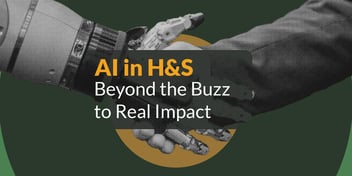If anyone’s watched the latest Netflix film Don’t Look Up, and secretly harboured a sense of impending doom or existential crisis - thanks to the obvious climate change analogy, then it’s safe to assume that sustainability has once again, become top of mind.
Whether you’ve watched the movie or not, the point we collectively keep circling back to is exploring how sustainability can be more effectively incorporated in the heart of any organisation. It’s clear that moving forward, we need to not just comply with sustainability regulations, but also generate a widespread culture change that puts green thinking at the centre of business strategy.
Certainly, the majority of organisations struggle to effectively engage staff and create momentum in their corporate sustainability and EHS initiatives. Often, sustainability programmes are stifled in bureaucracy, resulting in a lack of focus on effective collaboration and culture development.
Based on my research and experiences, organisations can usually be classified into one of four levels of maturity, depending on their performance and commitment pertaining to sustainability. At each level of maturity, organisations can face a range of challenges that prevent them from moving forward to the next level. A comprehensive understanding of the sustainability maturity model can help you discover and use the most appropriate tools to facilitate change.
Get fresh H&S insights weekly
The four sustainability maturity levels of the ecoWheel framework are:
1. Defensive:Defensive organisations are solely compliance-focused. In many cases, they don’t understand the environmental and safety legal requirements that are applicable to them – let alone comply with them. Defensive organisations often operate in markets that don’t have sufficient legal and market drivers and management typically see compliance as a cost to the business.
2. Proactive:
Proactive organisations are focused on reducing their costs. They have ad hoc and ‘end of pipe’ approaches when it comes to managing their safety and environmental risks. Proactive organisations often lack the resources and knowledge to use more systematic approaches to improving their performance.
3. Managed:
Managed organisations are driven by stakeholders requirements. As a result, their focus is often on gaining and maintaining certification to prove their credentials. Managed organisations typically have a lonely Safety or Environmental Manager or small team to measure and manage their impact. However, while the systems that they implement often tick the boxes of standards and certification requirements, in many cases they fail to engage staff and as a result don’t always facilitate meaningful and sustainable change.
4. Integrated: Integrated organisations use sustainability as a competitive advantage. They have a strategic and holistic approach to sustainability which covers the entire value chain. Integrated organisations collaborate with relevant stakeholders for mutual benefit and communicate transparently about their successes and challenges. Staff are fully engaged and sustainability is a long-term core commitment.
.jpg?width=800&height=419&name=Compliance%202%20(2).jpg)
As a sustainability change agent, it’s important to understand the maturity of your organisation, to enable you to most effectively support your company or client in making progress on the journey. Recognising where your organisational priorities lie when it comes to sustainability systems and initiatives is the first step to driving authentic cultural change.
If your company is Defensive, it’s important to prioritise your improvement efforts to ensure that the limited resources of the organisation are used in the most effective way and for optimising the potential return on investment. This is a critical mindset shift that can generate visible outcomes and ultimately create buy-in from upper management and key staff so that you can overcome their concerns or outdated perceptions about sustainable thinking.
For Proactive organisations, developing a strategy that considers key risks, challenges, opportunities and perspectives of stakeholders regarding sustainability, is essential. Businesses in the Proactive level of sustainability maturity typically focus on a limited scope - consequently, their primary challenge is to contextualise short-term projects in terms of their bigger picture and long-term strategic goals. This allows the individual actors, functions and departments within the organisation to understand how their activities fit into the overall corporate sustainability strategy.
While certification is a fantastic means to promote an organisation's commitment to sustainability, Managed organisations need to move beyond only ticking boxes of standards. In many cases where certification is the main driver for implementing a sustainability or EHS system, corners tend to be cut. Let’s face it, there’s limited value when all the details about your sustainability systems are stored away in the folder on the shelf that no one reads, collecting dust. Therefore, implementing an effective system that aims at engaging staff, whilst supporting a systematic reduction of an organisation’s impacts should be the main goal. Certification will come as a bonus - a byproduct of having well-functioning systems and processes.
Organisations at the Integrated level of sustainability maturity are few and far between. While many organisations claim to have sustainability embedded into all aspects of their business, this holy grail of corporate sustainability requires a paradigm shift in thinking away from business as usual. Alongside continuing their great work, Integrated organisations should ensure that they are transparently communicating their successes and challenges to their stakeholders.
What level of sustainability maturity is the organisation you work for? Do you have your own experiences and insights to share?
(Or any thoughts on Don’t Look Up?)
%20(2).jpg)


.png?width=352&name=Blog%20hero%20image%202406%20(4).png)
.png?width=352&name=Verdantix%20GQ%20Blog%20(4).png)
tal%20health.png?width=352&name=Lets%20talk%20(men)tal%20health.png)


